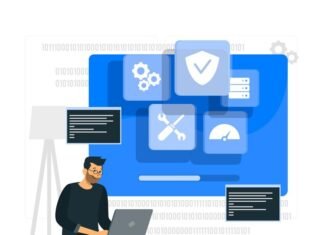The adoption of school management software (also known as school ERPs) has skyrocketed in recent years. These systems help schools digitize and automate various administrative processes like admissions, attendance, assessments, communication with parents, and more. However, as more and more student data is collected and stored digitally, security and privacy considerations have become paramount. Here are some key factors schools need to evaluate when implementing a school management system.
Securing Access to the System
Access controls are essential to restrict unauthorized access to confidential school data. Some best practices include:
- Implement role-based access control so users only see data relevant to their role. For example, teachers can only view their class rosters while admins can see school-wide information.
- Enforce strong password policies like minimum length, complexity, expiration, and lockouts after failed attempts. Consider multi-factor authentication for admins and privileged users.
- Log all access attempts and regularly review the logs for anomalies. Promptly deactivate accounts after employees leave the school.
- Use encryption for all sensitive data like student grades, medical conditions, addresses, etc. Data should remain encrypted even when stored.
- Isolate the school ERP network and servers from other networks. Use firewalls to only allow authorized connections.
Ensuring Physical Security
Along with digital protections, physical security of servers and devices is also crucial:
- Store servers and backups in a secure location like a locked server room with limited access.
- Laptops and devices used to access the system should not be left unattended in public areas.
- Dispose of old devices safely using techniques like disk wiping to prevent data recovery.
- Enable remote wipe capabilities on devices like tablets that leave school premises. This allows wiping data if the device is lost/stolen.
- Train staff and students on importance of physical security. Report lost/stolen devices promptly.
Managing Vendor Access
Many school ERPs rely on third-party vendors for hosting, maintenance, and support. Vendor access needs to be monitored:
- Review vendor agreements to ensure they pledge confidentiality of school data.
- Vendors should only get temporary, limited access to data required for their role.
- Access should use secure methods like VPNs or multi-factor authenticated sessions. Avoid vendors directly connecting to on-premise servers.
- Monitor vendor access logs regularly for unauthorized or suspicious activity.
Securing Data Transfer
When data is transferred between systems, it can be vulnerable to interception or tampering:
- Encrypt network traffic when transferring sensitive data. Use HTTPS and SSL/TLS protocols.
- Be cautious when integrating the school ERP with third-party applications via APIs. Review their security protocols.
- For bulk data transfers, use encrypted transport mechanisms like SFTP rather than regular FTP.
- When sharing data with other schools, use encrypted files and secure transfer methods.
Managing Backups
Backups are vital in case of disasters, hardware failures, or ransomware attacks. Some tips:
- Schedule regular automated backups – ideally daily – and store them encrypted.
- Keep multiple generations of backups (e.g. last 7 days) for greater resilience.
- Store backups off-site or in the cloud to allow recovery even if the school premises are inaccessible.
- Test restoring from backups periodically to verify their integrity.
- Control who can access backups to prevent unauthorized restores or data leaks.
Complying with Privacy Regulations
Schools must adhere to federal and state student privacy laws like FERPA. Key requirements include:
- Only collecting student data that is required for the school’s core functions. Avoid extraneous data collection.
- Allowing parents and students access to their own data records when requested. Having processes to correct any inaccurate information.
- Not disclosing student data to unauthorized third parties like marketers or advertisers.
- Transparently communicating how student data is used, stored, and secured.
- Having written policies, procedures, and training to ensure FERPA compliance across the institution.
Raising Security Awareness
With data breaches increasingly common, schools should actively raise awareness on security best practices:
- Provide regular training to employees on security topics like phishing risks, strong passwords, social engineering, suspect emails etc.
- Inform parents and students about the school’s security controls and how their data is safeguarded.
- Prominently publish information security policies so community members understand the shared responsibility.
- Develop and test incident response plans for scenarios like data breaches so stakeholders know what to expect.
Leveraging External Expertise
School IT teams should leverage external expertise when needed:
- Work with reputed vendors who demonstrate security is a priority in their offerings.
- Consider independent audits and penetration testing to identify any vulnerabilities.
- Research recommendations from industry groups like the Consortium for School Networking (CoSN) on school data security.
- Stay up-to-date on emerging threats and leverage resources from groups like the K12 Security Information Exchange.
Conclusion
Student data security should be a key priority as schools adopt modern management systems and digitize their operations. The recommendations above can help schools enhance security and privacy protections while still effectively leveraging technology to improve educational outcomes. With thoughtful policies and controls, schools can strike the right balance between security, privacy and progress.
Frequently Asked Questions
What are some key student privacy laws that schools must comply with?
The main federal law is FERPA – the Family Educational Rights and Privacy Act. Many states also have their own student privacy laws.
Should biometric data like fingerprints be stored in school systems?
Biometric data warrants extra care. Check state laws and seek legal counsel before storing such sensitive information.
How often should school conduct security audits?
Annual audits are recommended at minimum. More frequent checks may be prudent for higher-risk areas like external network penetration testing.
What security certifications should schools look for in ERP vendors?
ISO 27001, SOC 2, FedRAMP and FERPA compliance are examples of key third-party verified security certifications to look for.
How can schools securely share student data with authorized third parties?
Use encrypted files, secure protocols like SFTP, and access controls like temporary accounts to share only relevant data. Require confidentiality agreements.
Also read-https://maxternmedia.com/likes-on-instagram-what-they-mean-for-your-social-media-strategy/





